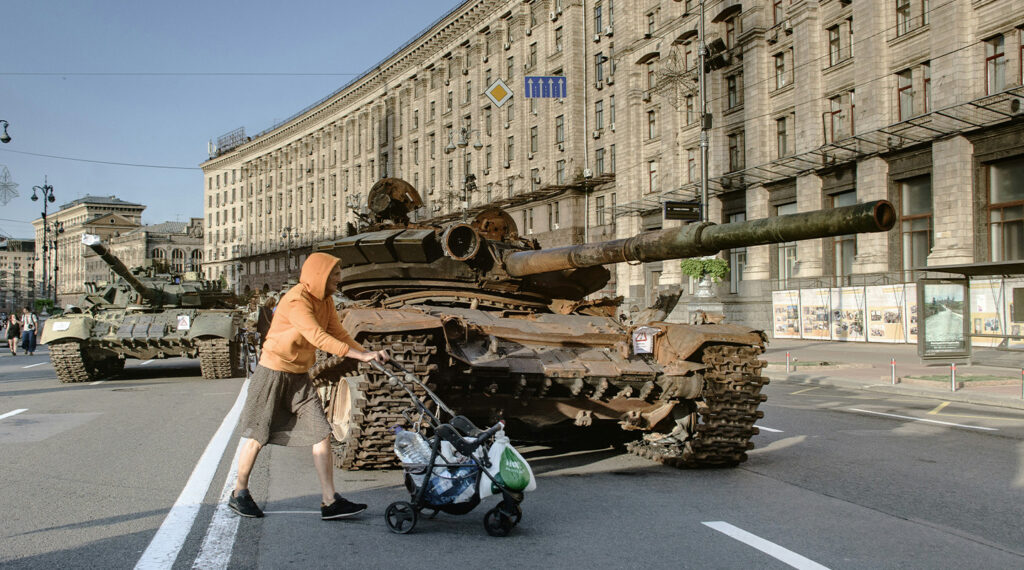Aid to Ukraine: From emergency response to recovery response

As the war in Ukraine enters its fourth year, the prospect of a just resolution remains elusive. These prolonged circumstances demand that humanitarian support for Ukraine transform into a more systematic, coordinated effort that can meet both immediate and long-term needs.
Three years of war and a shifting landscape of solidarity
On 24 February 2025, it will have been three years since Russia launched its unprovoked aggression against Ukraine. To contextualise this timeline, consider that the second front in World War II opened less than three years after Germany invaded the Soviet Union, heralding the final phase of the war. In stark contrast, the war in Ukraine is far from reaching a decisive turning point.
Throughout these three years, international military, financial and humanitarian aid has been a lifeline for Ukraine. Daily bombardments have destroyed homes, infrastructure, hospitals, schools and cultural landmarks, leaving millions in desperate need of medical care, food and shelter. International solidarity has not only helped alleviate immediate suffering but has also reinforced the resilience of Ukrainian society, providing hope amidst the devastation.
The Kiel Institute for the World Economy estimates that nearly €400 billion in aid has been pledged or delivered to Ukraine. While military aid accounts for the largest share, humanitarian support remains disproportionately small. This imbalance, however, does not capture the critical role of private philanthropic organisations. Though absent from official statistics, their contributions have supported hundreds of projects in culture, education and civil society development. Yet these efforts, while indispensable, have largely emerged as uncoordinated emergency responses, born out of urgency rather than strategic foresight.
Evolving from emergency response to recovery response
The initial phase of the war saw many philanthropic organisations operating in “crisis mode.” They focused on immediate relief, driven by empathy and the belief that the war’s end was imminent. I vividly recall this period, as I was among the thousands of Ukrainians who fled their homes, seeking safety for their children. Within weeks, I joined Erste Foundation to coordinate support for Ukraine, responding to an overwhelming surge of urgent needs.
By late 2023, it became clear that the emergency response approach, though vital in the war’s early stages, was no longer sufficient. The prolonged nature of the conflict required a shift toward recovery-focused efforts. This realisation led to the concept of a “recovery response” – a long-term, strategic approach that integrates Ukraine’s needs into the master plans of philanthropic organisations. Such a commitment requires financial, ethical and reputational responsibility, a level of dedication that only the most resilient institutions can sustain.
Foundations for Ukraine: A unified effort for recovery
In 2024, recognising the need for a collaborative approach, a group of leading European and North American philanthropic organisations came together to create Foundations for Ukraine (F4U). This global network unites foundations, grantmakers and philanthropic institutions with a shared mission: to strengthen Ukraine’s recovery and lay the foundations for sustainable development.
F4U serves as a platform for aligning priorities, fostering strategic coordination, and avoiding duplication of efforts. By sharing knowledge and pooling resources, members ensure that their support reaches the areas where it is most needed, maximising its impact. The network amplifies Ukraine’s voice on the global stage, advocating for its needs and mobilising international support. Most importantly, it works closely with Ukrainian civil society to ensure its actions are deeply rooted in the realities on the ground.
This is not merely a framework for dialogue or resource-sharing; F4U is a commitment to strategic cooperation and advocacy. It aspires to be a trusted ally to Ukraine, adapting to its evolving challenges while fostering long-term partnerships that can weather the uncertainties of the future.
A new chapter for philanthropy and solidarity
As F4U prepares to launch its core activities in early 2025, its founding members have already demonstrated the power of collaboration. The initiative is built on the belief that unity and synergy are the keys to justice and recovery. In bringing together institutions with shared values and missions, F4U creates a space where collective action transcends individual efforts, offering hope for a more sustainable and effective response to Ukraine’s needs.
The Ukrainian people have shown extraordinary resilience, courage and determination over the past three years. It is now up to the international philanthropic community to match that strength with a coordinated, strategic response. Initiatives like F4U are not just about supporting Ukraine’s recovery – they are about setting a new standard for how the world responds to crises, building systems that prioritise collaboration, impact and long-term commitment. As Ukraine continues its courageous fight for its freedom and sovereignty as well as the protection of Europe, F4U stands ready to ensure that international support remains steadfast and meaningful, helping to lay the groundwork for a brighter and more resilient future.
Foundations for Ukraine, in collaboration with Philea and the Council on Foundations, will host “Ukraine’s Fight and the Global Stakes: Why Philanthropy Can’t Afford to Look Away” online on 27 February.
Authors

